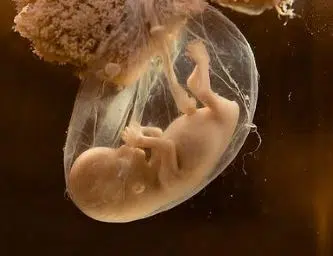Opinion
By Alexandra R. Lajoux
02-09-24
“All rise. Hear ye, hear ye, hear ye. The Supreme Court of Florida is now in session. Let all who have cause to plead, draw near. Give attention. You will be heard.” Thus spoke the Court Marshal on the morning of Wednesday, February 7, 2024, using Revolutionary-era language that stirred the hearts of those who hoped—and still hope–that the Court would hear enough about the flaws in proposed ballot measure 2023:1392, Limiting Government Interference with Abortion, to strike it down on legal grounds. Unless the court rejects its wording as improper, the amendment—which aims to eviscerate governmental powers to protect the unborn and to regulate abortive medical procedures in Florida–will be placed on ballots in November 2024.
Chief Justice Carlos Muñiz, presiding over the court’s six other justices, first heard from the Office of the Attorney General of the State of Florida, represented by Nathan Forrester, Florida’s Senior Deputy Solicitor General (hereinafter Deputy Forrester), who stated that the proposed amendment “should not be placed on the ballot” because it is “misleading in multiple respects.”
With only 15 minutes to make his case, and yielding some of his time to Matt Staver of Florida Voters Against Extremism, Deputy Forrester had only had time enough to explain one of the many ways the measure misleads, namely that “it tells something about the amendment that is literally untrue.” The proposed ballot measure in question reads as follows: “Limiting Government Interference with Abortion. Except as provided in Article X, Section 22 [referring to parental notification] no law shall prohibit, penalize, delay, or restrict abortion before viability or when necessary to protect the patient’s health, as determined by the patient’s healthcare provider.” The ballot summary adds “This amendment does not change the Legislature’s constitutional authority to require notification to a parent or guardian before a minor has an abortion.”
Forrester focused on the falsity in the statement “No law shall…restrict abortion before viability or when necessary to protect a patient’s health as determined by the patient’s healthcare provider,” noting that the federal Partial Birth Abortion Ban Act of 2003 already “does restrict abortion in both these circumstances.” (Note: So too does Florida law. In 2022, Gov. DeSantis has already signed a bill banning abortions after 15 weeks, prompting the ACLU to challenge it before the Florida Supreme Court, and subsequently, Governor DeSantis signed a six-week abortion ban that will replace the 15-week ban, unless the latter is rejected by this court.)
But Justice John D. Couriel pushed back against Forrester’s opening point, arguing that the word “shall” is not meant to be a “descriptive statement” but rather a “command,” and Justice Charles Canady agreed. But Justice Jamie R. Grosshaus backed the state’s argument by asking whether a ballot summary is intended to clarify what an amendment says, or what it does – and implying that it does indeed have a burden to explain what the material effect of the amendment would be. Forrester stated that the latter was the case.
Chief Justice Muñiz then asked a pivotal question—whether an unborn child at any stage of pregnancy is covered by Article 1, Section 2, the Basic Rights provision of the Florida Constitution. That provision states: “All natural persons, female and male alike, are equal before the law and have inalienable rights, among which are the right to enjoy and defend life and liberty, to pursue happiness, to be rewarded for industry, and to acquire, possess and protect property. No person shall be deprived of any right because of race, religion, national origin, or physical disability.” A ballot summary, said the Chief Justice, should explain any effects that a proposed amendment may have on other parts of the Constitution, and this is an example of such an effect.
In response, Deputy Forrester candidly stated that the State of Florida had not considered this particular reason for rejecting the amendment but he found the argument “viable,” citing the case of Askew v. Firestone (1982). Continuing his line of thinking, Chief Justice Muñiz reflected, “I don’t know that I could affirmatively say that the term ‘natural persons’ as a matter of ordinary meaning, does not include the unborn.”
Wrapping up his opening statement, Deputy Forrester cited Florida Statute Title IX Section 101.161, in requiring clear and unambiguous language, has an implicit requirement for accuracy and this measure fails that test.
Joining the State in asking the Court to strike the measure was Mat Staver, founder of Liberty Counsel, representing Florida Voters Against Extremism. He accused the proposed amendment of logrolling by combining too many subjects, namely four different categories of restrictions.
Justice Couriel then questioned if the measure was truly a “wolf in sheep’s clothing” or simply a “wolf.” That is, when reading it, will voters be able to see it for the extreme measure it is? In arguing that the measure is obviously extreme, he noted that a “healthcare provider” could be a tattoo artist. He asked Staver what he thought the court should do. “Strike it down,” responded Staver, noting precedent.
Chief Justice Muñiz observed that if his measure passes, it will be “litigated forever.” But Staver pointed out that in its extremist measure would “disable all three branches of government,” making effective litigation difficult.
The court then turned attention to the group sponsoring the proposed amendment, Floridians Protecting Freedom, Inc., represented by attorney Courtney Brewer, who began by citing the case of Dobbs v. Jackson Woman’s Health Organization (2022), which overturned Roe v. Wade (1973) by returning the power to restrict or permit abortion to the states. Justice Grosshaus returned to her earlier question. She said a summary should explain not just what the amendment says but what it will do, or in legal language, provide fair notice of effects, whether legal or material, implying that this summary fails to do that. Justice Sasso expressed agreement, stating that there is “no explanation of the legal effect” of the amendment. “There’s two scenarios: Either the words are undefined and it’ll be played out later down the line, in which case the voters are not advised of that, or this has a very clear meaning and the voters are not advised that this is going to shift policymaking from the Legislature to this expert class of doctors to determine the conditions under which people can end lives in Florida,” she said. “So I am wondering why, if those are one of the two scenarios, why neither of those are explained to voters?” Brewer replied that such matters could be determined through litigation.
This prompted Chief Justice Muñiz to return to his point about the right to life under Florida Constitution Article 1, Section 2 “If you are going to alter the Constitution, it should be explained.” He added that voters, not courts of law, are supposed to be the ones making the initial determination as to what the proposed amendment means, and what effect it will have on the rest of the Constitution. Returning to Article 1, Section 2, he asked: “Can we say all natural persons excludes the unborn?” He pointed out that for the past 100 years, Florida courts have considered that the unborn have some rights.
Brewer responded that the proposed amendment was clear and stated that there was no need to weigh into other Constitutional issues. Justice Couriel appeared to agree, noting that the measure was obviously sweeping in its effect.
Justice Renatha Francis asked Brewer what she thought of the claim by the Susan B. Anthony that chief purpose of the measure, if passed, is to “enshrine in Constitutional cement abortion without restriction for the entire nine months of pregnancy.” That purpose, said Justice Francis, “is not being communicated to the voters.” Gov. DeSantis appointed Francis to the Court in August 2022 to represent the fourth congressional district. Justice Jorge Labarga, who was silent in this day’s arguments, also represents the fourth district, due to redistricting. Appointed by Gov. Charlie Crist in 2009 (before Crist switched parties to become a Democrat), Labarga is considered to be less conservative than the others on the bench.
In his closing comments, Deputy Forrester argued that the language of the amendment had an elasticity of meaning that was not clarified in the ballot summary; a wide range of meanings could attach to it leading to the effect of people viewing the same language in two different ways—like a “Rorschach test”—making the final count of votes “inaccurate.”
Will the court reject the proposed amendment? There is hope. At least three justices—Justices Grosshaus, Sasso, and Francis, who happen to be the three females on the bench—seemed skeptical that it would pass legal muster. And although Chief Justice Muñiz did not seem moved by the argument that the measure was misleading, by mentioning Article 1, Section 2 repeatedly, he did lay the foundation for an argument that it is unconstitutional.
Alexandra Lajoux is the author of a letter submitted to the court on behalf of Family for Life, a group that prays for and defends the life of the unborn. A link to the letter is here: https://www.citizensjournal.net/wp-content/uploads/2024/02/SC2023-1392-Family-for-Life-Letter-to-the-Court.pdf
Editor’s note: Last week, the Florida Supreme Court heard arguments hearing on a proposed constitutional amendment which, if passed by voters in November, would remove all impediments to abortion in Florida. Opponents argue that the measure is misleading because it does not make that fact clear. For the rest of the week, mainstream media accounts featured quotes along the lines that “Florida voters aren’t stupid,” making it seems as if the Court was fine with the wording of the amendment and would allow it on the ballot. But this blow-by-blow account of the arguments gives us some hope that the court may indeed strike this heinous measure before its April deadline.
The views expressed in this commentary are those of the author and do not necessarily reflect the official position of Citizens Journal Florida









